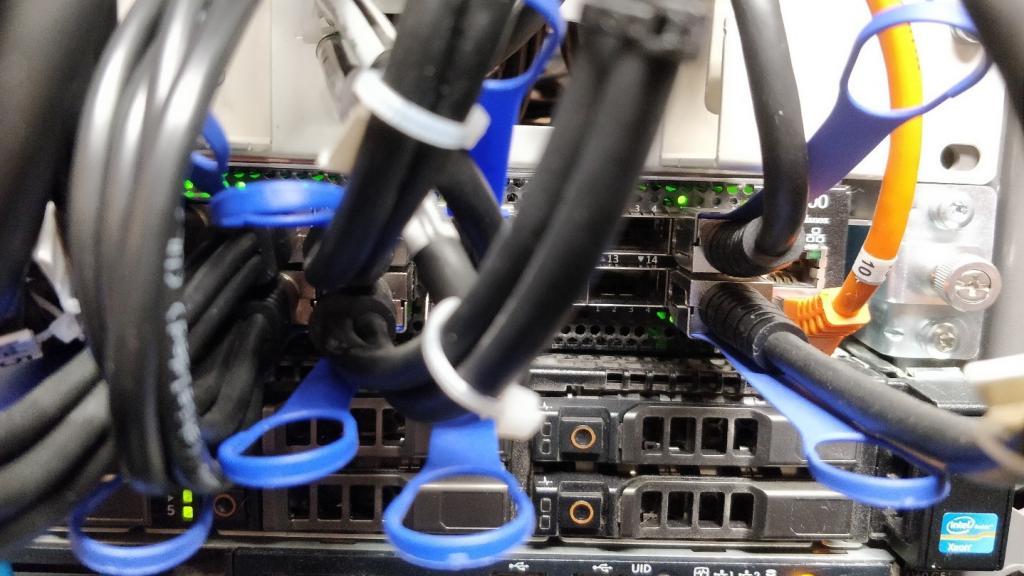Introduction
Carsten Rachfahl and I were working in the lab together last week. In the evenings during our end of year self-improvement hackathon. We had both seen the rumor that Microsoft was considering buying Mellanox. While we love Mellanox and Microsoft technologies I have mixed feelings about the rumor.
It’s no secret that I use Mellanox cards and switches to deliver on our quest for excellence. Not because we make money from selling Mellanox but because they deliver great value for money. Their NICs and switches allow me to have 25Gbps at a cost and quality level traditional network companies won’t allow.
Figure 1: Lab time – testing assumptions in our designs
So here are my own personal complete and utterly speculative musings on this news.
Kindling for the fire of this rumor?
Clouds are built on highly customized purpose-built hardware designs at scale. At scale, cloud leverages commodity components as well as specialized and dedicated engineering in a way only such big players can.
More and more the cloud players are building their own composable infrastructure. They not only have the scale required to do this but that same scale actually also requires or even forces them to do so more and more. FPGAs are a big part in this. It’s an area where Mellanox shines with FPGAs and Mellanox Spectrum.
Some at Microsoft don’t like RoCEv2 due to some of the networking complexities. This leads to support calls that cost resources (time, personnel, money) and may lead people to think Microsoft has issues while the root cause is badly configured networks. A bit like NT 4.0 and ridiculously bad drivers in the day. Microsoft goes as far to as advising to use iWarp to their SMB 3 customers. So why would they want to buy “the RoCE” company?
In sharp contrast to the advice given to us, Azure leverages and customized their RDMA networking around RoCEv2. It is a publicly known that Microsoft used RoCEv2 in the datacenters of Azure. Normally with a truckload of Arista switches but I would not be surprised they also use Mellanox switches. Mellanox is a leader when it comes to FPGAs and all kinds of programmable logic in the switches and NICs. As such it is also an interesting company to other players active in datacenter and cloud technologies – scale wise you can count them on the fingers of one hand.
Maybe the advice to use iWarp isn’t just about avoiding issues with bad network configurations. Maybe it was the first step to tell us something else, something bigger? Paranoid much Didier?
Why might they want to buy Mellanox
Maybe it is just a way for Microsoft to ensure the supply chain and drive the research and development with a focus on the needs they have in Azure. It is probably not just about controlling and reducing costs. That might be a nice side effect but an acquisition is quite an expensive undertaking. So maybe there is more to this than just cost and supply chain.
It could be a strategic move to block competitors and make sure they, for a period of time, control some of the best technology out there and providing a competitive advantage.
Note that Mellanox isn’t a China-based company if you want to bring geopolitics into this. Maybe we should. What if another global player was to get hold of Mellanox? Huawei, Baidu, Alibaba, and Xilinx are companies that are interested in that technology and could grab it for themselves. Alibaba is a cloud provider many in the west seems to forget about but for buying stuff. Which is interesting as most are aware that Amazon is a lot more than a platform to “buy stuff”. The same is true for Alibaba. While we tend to focus on the battle of two for cloud world dominance the 3rd player moves on the world chessboard with strategic insight and intent. That third player also has the resources to execute, while the west seems hell bound to cost-save itself into irrelevance. But this is me speculating. I could be wrong. Maybe they don’t need Mellanox and have all the engineering prowess they need.
Also, It’s not just cloud players or geo-political companies that are gunning for Mellanox. With Xilinx it the rumors are more to the point where price and dates are mentioned Xilinx working with Barclays to acquire Mellanox, deal could be announced in December, sources say.
Broadcom also has an eye on them according to some analysts. Mellanox would fit Broadcom like a glove talks about Broadcom (who is in direct competition with Mellanox, see http://www.mellanox.com/related-docs/products/tolly-report-performance-evaluation-2016-march.pdf ) and also mentions Xilinx. While Xilinx interest is “public” knowledge (Xilinx going after Mellanox, which seems to state they are pursuing it actively) the article also mentions NVIDIA and even Intel as well as Oracle. These seem less likely to me as they have too much on their plates in regards to challenges already in my humble opinion. NVIDIA might have my preference of those 3 in the bigger scheme of things but I’ll leave it at that.
Anyway, it might be that Microsoft is just trying (or at least considering) to head of the competition at the pass. It would not be in their interest to see certain players get a hold of something that is a key technology to them. While some of the candidates are less of a problem for Microsoft, bar some price hikes but some could lock them out of the market completely. Yes, economies of scale only work when people want to sell to you.
Mellanox offers value for money I would not like to lose
Mellanox makes excellent NICs and switches. Whether you need TCP/IP, RDMA (RoCEv2) or InfiniBand. In high-performance computing, they are a reference point. I’m sure some shareholders would like to see even more money and sale could provide them with some wealth. But the value of a company like Mellanox goes beyond that.
For me, as a customer and technologist, implementing Mellanox to leverage its capabilities in my high value, cost-effective high available and performant designs it worries me. It could prevent me to buy the equipment I need at prices that do not break the bank. Sure, over time, a new player might fill the void. But that could mean years of supply chain problems.
But it is not just about me. Look at some other players. Intel is competing more with Mellanox in the space of High-Performance Computing trying to grab market share from InfiniBand with Omnipath. All this while having a lackluster iWarp offering. Taking Mellanox out might be great for Intel but not good of the rest of us. Intel needs competition to be at its best. Look at where they are at with CPUs again versus AMD, with GPUs versus NVIDIA/ATI … It would be a disturbance to the market and not a good one.
I know that some lifelong networking professionals don’t like Mellanox (or any other players). That is actually their problem. Their former dominance has led to arrogance and complacency. They are trained and molded into their own specific way of thinking bashing anything that doesn’t conform to it. They have done this to a level they cannot think very well outside of their self-created box. The result is ever more customers are choosing other solutions as the big “IBM like” network companies don’t deliver what customers need. Mellanox does and we’ll take a “weird” CLI and GUI if that’s what it takes.
I would tolerate a moderate price hike if that would mean Mellanox can remain as an independent company. I hope Mellanox sees a future for itself without an acquisition as I feel we’ve seen quite enough of them in the network world and it takes energy and resources away from independent engineering. The world can use more out of the box thinking and independent engineering, as long as it is of high quality. I can only guess to what Mellanox thinks of all this. They do not consult or inform me on these matters.
One thing is for sure, all this talk about people wanting to get a hold of them can’t be bad for their market value.
Speculation galore here!
I hope I am wrong about this. Microsoft Azure has only one prime directive and that is to make money by ever-growing consumption of their cloud services. Given their recent “advice” for iWarp when deploying SMB Direct Workloads (S2D, Storage Replica, CSV, Live Migration, file copies, …) I fear that they would have no interest in providing us with Mellanox gear in the future. I fear they will focus on their own needs and supply chain. Which means that a big huge player could just take this technology of the market for their own gain. They can make it more expensive for us and guide research & development to custom solutions only they need or take it off the market. Maybe they won’t, but it is a risk. Maybe all they want is to keep the technology out of their biggest competitors’ hands and have no other ambitions.
The war between the cloud giants for ever more consumption of their offerings leads to optimization at a scale that consumes much of the production capabilities in our industries. Skill sets, technology, energy … they are becoming ever more vertically integrated, bigger and more and more dominant. The fact that these companies can do this is disconcerting to smaller players. I might not like it, but it is a reality.
Well, that’s the impact it has on a small fish like me. I’m actually more like plankton when it comes to size. Smaller fish would be the traditional OEMs who need Mellanox. Or would they, at their scale, be able to let it go and just stick to iWarp, overprovisioned switches and offloaded TCP/IP without RDMA for their non-cloud scale needs? That decision could very well be made for them by a very big player. We could speculate if any OEM would like to buy Mellanox (I would think so) but I don’t see any of then having the war funds to finance that for the moment even if they wanted to. Some OEMs don’t even have the focus to do anything useful with the Mellanox technology.
As the cloud providers become so big and powerful, they become strategic force multipliers. Just like energy, healthcare, education, and justice are a backbone to a nation’s welfare and future, so is (cloud) IT. This means that, sooner or later, it is inevitable that regulation is put in place by governments to control and steer their actions. Self-regulation alone will not do it, the Chinese realize very well you need both to work hand in hand and balance each other. Then again, if the prediction that cloud alone might already consume 20% of the world electricity consumption by 2025 doesn’t wake anyone up, why would buying a mid-size company ring any alarm bells?



